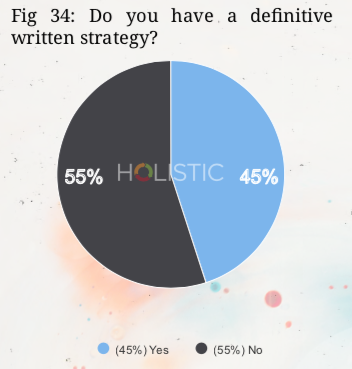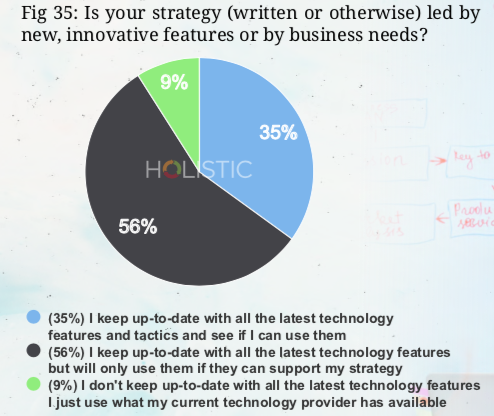OI Discussion: What is Holding your Email Marketing Program Back?
Tim Watson: Hello Everyone
Here goes for the 4th in the series of weekly OI discussions.
What is holding your email marketing back? I’m sure most of you know what you’d like to get done.
I meet lots of smart people, both at the brands I work with and when speaking at events. I often find that vision isn’t an issue nor is identifying new innovations and email opportunities.
Time and resource is a big universal challenge.
But bigger than that is focus. Whilst time and resource will always be a challenge (nobody has too much, right?), continual re-planning every week, no focus, is holding email back.
Steve Jobs, Warren Buffet, Bill Gates all said the number 1 thing that made them rich is focus.
In my OI article last week I shared my experience with one client; we’ve seen a 22.4% YTD email revenue increase. Good strategy played its part but excellent focus is what really made the difference. The business transformed using a methodology called EOS (entrepreneurial operating system). My OI article summarizes how they plan and successfully execute strategy.
I see occasions when good strategy is derailed because of continually changing priorities. It’s a productivity killer. It’s a team moral killer. It’s a success killer.
Most of my work is with brands in the $4m to $50m range. Perhaps it’s different for start-ups and large enterprises.
What are your thoughts on these issues and questions:
- What do you find is holding your email back?
- Have you heard of EOS (entrepreneurial operating system)?
- You can’t have email strategy without marketing strategy, you can’t have marketing strategy without business strategy. How does your company align from top to bottom?
- Focus inevitably means often saying ‘no’. What methods have you found to say ‘no’ (or ‘no not now’) and maintain focus?
Kind regards,
Tim.
Jaffer Ali: Tim:
80% of our business is driven via email in one form or other. This is extremely high as we focus on this channel obsessively. We say “no” to nearly every best practice uttered by pundits. Dela and Bob have for years spoken about fear and loathing amongst the email cognoscenti.
Anyway, may I make a suggestion for what it’s worth. Use email to drive OTHER ways to build your own media. First realize that email is MEDIA and can be used to build other media assets you can own. Like what? Use email to drive SMS Text subscriptions which is actually even MORE powerful to build sales than email. Also, use email to build Web Notification subscriptions. Of course we have been using email to drive our video demonstrations. Video media is extremely powerful…Email is the central driving force of our business.
With web push, your cost of deployment of offers will sink to about $.10 per thousand. The cost of serving video on your site is even lower if you use You Tube.
Chris Marriott: Hi Tim:
We specialize in helping enterprise brands with the ESP RFP process, and I can tell you that the biggest issue most of our clients face has little to do with the capabilities of the platform, and lots to do with having the resources available to leverage those capabilities--whether those people are at the ESP or at the client. So your "time and resources" points are spot on.
You mention "focus" as being a big issue as well. My guess is that it's hard to focus on anything but what is in front of you when you are constantly putting out fires created by the lack of proper resources. For all the talk about automation, email marketing still requires person behind the scenes creating rules, developing content, testing new approaches, etc. You can have all the technology in the world, and still be getting no where if you don't have the people skills required to leverage that technology.
Not sure I can add a great deal to what you've laid out Tim. There are so many reasons why email programs get stagnant. Sometimes it organizationally driven, sometimes its resource driven and Chris makes a good reinforcing point, about lack of resources holding you back, all sound observations .
What I've found in my many years in this space is.. those that have the most successful programs (and most of the most successful are NOT the ones you see at events or published), are ones that have a performance culture. I think a good exercise (and not viable in some companies), but draw up performance incentives that are aligned wth company goals. Sure most have bonus programs, but what if you had to operate like an affiliate marketer or a Pay per performance program? What if you were paid on a CPA basis, no salary. Would you look at your program differently? How would you look at creating change? what areas in process would you innovate arouund to make you faster and more agile? How would you look at external contractors as support functions? I bet things like attribution and measurement would be at the heart of how you operate. Iteration and speed would trump internal obstacles.
I think state of mind plays a big part in this view of "how to improve"... How many email marketers would be bold enough to negotiate this type of employment agreement? Are you confident enough? feel you have enough control? Try putting that hat on and looking at what you are doing .. would you just pack it up and leave or force the change you need, regardless of the obstacles?
Kath Pay: Hi Tim
Brilliant set of questions there....I'm not going to answer all of them :-) (mammoth task!) but will 'focus' (hehe) my reply on just one - strategy or rather lack of strategy and delve slightly into the focus question as they overlap.
For the past 10 years of me being an email marketing consultant, I've focused on strategy, as I've found the lack of a strategy to be the key reason that holds marketers back. A consequence of the lack of a strategy is lack of focus, as they have no roadmap to guide them and as such are happy to go whichever way a shiny whistle (ie. new technology feature or tactic' pulls them.
The lack of strategy is caused by a few things: lack of time, lack of budget, lack of resources - as well as lack of know-how.
Holistic recently conducted some research and released a report on vendor satisfaction and usage and we found that only 45% of email marketers have a written strategy..

But thankfully 56% of those email marketers surveyed said that their strategy is led by business needs, not technology and tactics. However, to your point Tim, whilst this is the majority - it's not a huge majority by any means. Meaning that the remaining 44%'s focus is most likely jumping from tactic to tactic and feature to feature, rather than remaining focused on their roadmap (business-led strategy).

My take on the cause of not having a strategy is as follows: It stems from email marketers working in a channel that is under-appreciated, under-reported and incredibly busy (because it brings in the goods). You can read more about this here and here. What this then has created is a channel of marketers who are looking for the 'silver bullet' to solve their problems. I don't blame them - not one bit. I fully understand the pressures they deal with. So they seek the answer in a new piece of technology, a new feature or a tactic. This brings about the lack of focus, as they don't have a roadmap to stay focused on, and continually chase the next shiny thing that is put in front of them in the hope that this is the silver bullet they've been looking for.
Many email marketers that I've taught or consulted with, become an email marketer/manager/director etc. from the ground up. The majority don't have a marketing degree and as such have never been taught how to create a strategy, Indeed my services are often employed by digital and email marketing agencies, because they also don't know how to create a strategy.
So, to the email marketer, creating a strategy does not seem to be the silver bullet they're looking for - whereas in fact, it is just that. If we go with Merriam-Webster's definition: "a silver bullet is something that acts as a magical weapon especially : one that instantly solves a long-standing problem". Let me tell you - if you want me to turn up to a new venue that I've never been to before, I'm going to turn straight to google maps and refer to the roadmap and directions it lays out before me. In all simplicity -t his is what a strategy is - instructions on how to get to a place you want to go to.
Bob Frady: Here's a factor...
Re-building and/or launching an email program - to get it really humming - takes an enormous amount of work and is really fun. Once that challenge is overcome, you get to a point of stasis and the innovators flee (or get told "you're not working hard enough.")
Email problems are like a virus - if you ignore them, they'll come back. Let them go too long and you'll have real problems. Hopefully, the innovators have trained up the next level of people to take over and tamp down any issues. It seems that - instead - organizations think "we solved this problem" and reallocate the innovator's salary to other areas. And the cycle begins anew...
Jaffer Ali: Let me suggest something contrarian..surprise! The “attribution” meme actually inhibits much by putting resources trying to find more revenue to attribute to email (or pick a platform). This hunting for attribution revenue comes at a cost; spending time chasing attribution rather than actually innovating.
I will speak as an entrepreneur that INSISTS on the simplicity of last click attribution. We put our money where our mouth is…the ultimate skin-in-the-game. The mythical hunt for the fountain of youth was a folly as is developing ever more complex algorithmic attempts to squeeze every attributable dollar to every platform.
So, the energy for improving email revenue requires developing new ways to use email. How much wasted time and resources is used for attribution versus innovation? By the way, the attribution meme is promoted by vendors and media owners… it is a waste of time and effort if you are spending your own money rather than trying to justify to some VP of marketing why email is the bomb…
Also, if you are an entrepreneur, a related issue of attribution is using LTV…another mythical and incalculable metric that distracts from what you really should be doing.
If your email program is stagnant, I will guarantee that the problem is that YOU have become stagnant. This is a problem if you have been in the email industry a long time…and then go to the same conferences, listen to the same people…and are exposed to more mundane thought leadership.
Since I have no day to day responsibilities, I spend my time talking to people. Yep, old fashioned talking to people on the phone. I see one nearly immutable fact; most people are so frickin’ busy they do not have time to think, react, innovate, apply a principle from a completely disparate discipline… Read Ed Thorpe’s Beat The Dealer… Taleb’s Antifragile… visit conferences outside your discipline.
If you want to stay away from stagnant thinking, stop obsessive focus on mice nuts.
Jenna Tiffany says:
Sorry I am a little late to the party, travel delays scuppered all of my plans yesterday and as it’s in the same week i hope it’s welcomed :)
I was lucky enough to have a fanscianting discussion about this discussion in person with Tim on Thursday.
From my experience both consulting with brands and having worked inside a number of different businesses I’ve seen time and time again the biggest downfall in creating or even having a focus on the marketing/email strategy is that the business doesn’t a clear strategy. If a business doesn’t set the vision, the focus and the goals at the very top, then there is nothing to clearly guide the direction of where the business is trying to head to the rest of the company, and that includes marketing.
If the business direction isn’t clear it’s open to interpretation. This results in marketing, product, IT departments all with very different strategies that aren’t all pulling in the same direction.
For me this is the major challenge for a number of organisations. Clear business direction results in a clear business strategy which filters into a clear marketing strategy and then email has a clear focus on what it needs to achieve to support the fulfilment of marketing and business goals.
Without any of this, the strategy is open to interruption by a new ‘idea’ every day of the week and then it becomes a very tactical approach with no clear goal in sight.
There are also a lot of misinterpretations of what a strategy actually is and I agree with Tim, it isn’t difficult but it does take analysis into where the business is now (both internal and external environments) and focus to get it right. This can be extremely challenging if the day to day is already a struggle.
Tim Watson: As the week comes to an end, some closing remarks….
Jaffer (Ali) -
>> Also, if you are an entrepreneur, a related issue of attribution is using LTV…another mythical and incalculable metric that distracts from what you really should be doing.
There is no doubt there is good strategy, OK strategy and bad strategy. In the past you’ve shared your experience, a strategy of attribution/sophisticated models and use of LTV. You executed this strategy. You found these were not good strategies. That’s great. You had focus. You set a strategy and followed it. You changed it with learnings and set new strategy and continue to be focused.
My key point is keeping focus on strategy is more difficult than creating strategy. I see innovating as entirely consistent with strategy and focus. In fact, having focus is necessary to innovate. Focus doesn’t mean you can’t change or innovate.
Kath (Pay) –
>> if you want me to turn up to a new venue that I've never been to before, I'm going to turn straight to google maps and refer to the roadmap and directions it lays out before me. In all simplicity -t his is what a strategy is - instructions on how to get to a place you want to go to.
Totally. Setting strategy is not so hard. Focus is what’s hard. What happens is the directions are set for the next 90 days. Then 2 weeks later a new priority arrives that forces a large detour in the route with the result the original destination is reached late, or worse - not at all.
In 99% of cases, if that new priority wasn’t thought about at the time of route planning, it was bad planning, or a department trying to be strategic when the company as a whole isn’t.
David (Baker)
>> What I've found in my many years in this space is.. those that have the most successful programs (and most of the most successful are NOT the ones you see at events or published), are ones that have a performance culture.
This is a fascinating question but I don’t agree with your approach. Unless you are the founder, or someone with near FULL control, it’s hard to use the model of pretend you’re an affiliate marketer within your company. You don’t have sufficient control on many things you need, perhaps the products, the pricing, the delivery chain. You need responsibility and authority for it to work. And that aside Daniel Pink has talked and published lots about motivation - this video is a favorite of mine. What motivates individuals. It’s a must watch https://www.youtube.com/watch?v=u6XAPnuFjJc. It’s a hugely creative and engaging video, as well as having a surprising message.
Bob (Frady)
>> It seems that - instead - organizations think "we solved this problem" and reallocate the innovator's salary to other areas. And the cycle begins anew...
I think you’re saying that the problem of focus is not within the email team, nor the marketing team necessarily. It’s an organizational issue.
And that is spot on.
Strategy execution needs focus. You don’t get the chance for that unless it exists from the top down. Unless you are saying “no”, or rather “no – not now, but it can be evaluated at the next strategy review”, you don’t have focus.

 How to resolve AdBlock issue?
How to resolve AdBlock issue? 